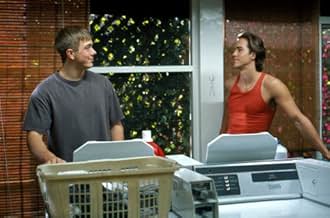Ein promiskuitiver schwuler Partylöwe verliebt sich in einen jungen mormonischen Missionar, was zu Krisen, Klischees und Katastrophen führt.Ein promiskuitiver schwuler Partylöwe verliebt sich in einen jungen mormonischen Missionar, was zu Krisen, Klischees und Katastrophen führt.Ein promiskuitiver schwuler Partylöwe verliebt sich in einen jungen mormonischen Missionar, was zu Krisen, Klischees und Katastrophen führt.
- Auszeichnungen
- 3 wins total
- Julie Taylor
- (as Rebekah Jordan)
- Elder Harmon
- (as Rob McElhenney)
- Noreen
- (as Judith Morton Fraser)
Empfohlene Bewertungen
That is the premise of "Latter Days", a 2003 film, written and directed by C.Jay Cox, himself a former Mormon missionary. The film's story is, of course, highly relevant, especially in contemporary America. Variations of this story need to be told, and retold, and retold, hopefully in future films ... because the underlying theme brings to light the hatefully superior attitude that Christian fundamentalists too often display toward gays. By its nature, "Latter Days" is provocative, and I doubt that the film was well received in Provo or Pocatello, even though the script is intelligent, sensitive, and insightful.
descrimination, but will learn some REAL religion which teaches tolerance and love and understanding. C J Cox understands the real meaning of these issues, and shows a firm grasp
of the concept of humanity, and love. This is a finely crafted, humorous, and exciting take on what it means to be gay and to learn the meaning of love; in it's most broadest meaning, is an extremely moving, emotional journey. This film
has lots to say; "and it's beautiful, and it's good."
Maybe it is stereotypical, and maybe its not Academy Award material (I like few that are), but it really touched some hot buttons with me, and it moved me to tears in the end. I thought that Cox and company did a great job summing up such deep subject matter in such a short time.
For those who think it's hoaky, I say relax, its just a movie. I lived many parts of the real-life version of this story, and it wasn't always pretty. While never a Mormon, I have "wrestled with the angel" for most of my adult life, still trying to reconcile my gay being with my spiritual being. Long-term denial of my sexual identity at an early age led me into a lengthy struggle with drugs and alcohol and a near-death experience 11 years ago. I even looked into aversion therapy once as a way to "cure" myself from homosexuality. Trust me, its better to see this unfold in a movie than to have lived it.
While it may be steeped in stereotype and clichés, as many critics have suggested, Latter Days manages to expose many shallow traits among the major elements in this story: organized religion, gay culture and even Hollywood itself (I love how Cox portrayed L.A. as an additional "character" in the movie).
I thought that the acting was terrific, especially Sandvoss as Aaron Davis. The music is as touching as the story (I recommend the soundtrack too). I can't speak for most moviegoers, but this one will stick with me for a while, and few ever do.
Wusstest du schon
- WissenswertesThis film was originally to be shown in the "Madstone" theater in Salt Lake City, Utah (which has a heavy LDS population) on the day of its national release, but the theater pulled it a few weeks before it was scheduled to open. The reason given was that the film "lacked artistic merit", but the film's promoters contend that the theater management gave in to local pressure not to show the film due to its unflattering portrayal of the LDS Church. The film was shown a few weeks later in a different Salt Lake theater and attracted a large audience.
- PatzerWhen asked for his first name Aaron says he is not allowed to use his first name. Missionaries are not allowed to call each other by their first name but there is no rule that says you can not tell people your first name.
- Zitate
Lila Montagne: Chris? Sit down.
[he comes over and sits down, as she pours him a brandy]
Lila Montagne: Drink that.
[he takes a small sip]
Lila Montagne: Toss it, that way it's medicinal.
[he knocks back the drink]
Lila Montagne: Good! It's vital for a man to have a couple of slugs in him before discussing heartache. I think Hemingway told me that.
Christian Markelli: You knew Ernest Hemingway?
Lila Montagne: Margaux, actually. But beauties don't always escape tragedy.
Christian Markelli: Oh, God, this is hell! I've done something... I'm guilty. And I'll burn for it.
Lila Montagne: Funny thing about guilt: There's nothing so bad that you can't add a little guilt to it and make it worse; and there's nothing so good you can't add guilt to it and make it better. Guilt distracts us from a greater truth: we have an inherent ability to heal. We seem intent on living through even the worst heartbreak.
Christian Markelli: How?
Lila Montagne: Hm. Practice.
- Crazy CreditsA Special Thank You to... The Erik Palladino Screening Room and His Xylophone Backup Singers
- Alternative VersionenThis film is available on DVD in the US in R-rated and unrated versions.
- VerbindungenReferenced in Straße der bösen Jungs (2012)
- SoundtracksWindmills
Performed by Toad the Wet Sprocket
Written by Dan Dinning, Randel Guss, Todd Nichols & Glen Phillips
Published by Sony/ATV Tunes, LLC (ASCAP
Courtesy of Columbia Records by arrangement with Sony Music Licensing
Top-Auswahl
Details
- Erscheinungsdatum
- Herkunftsland
- Offizieller Standort
- Sprache
- Auch bekannt als
- Hội Thánh Hữu Ngày Sau
- Drehorte
- Produktionsfirmen
- Weitere beteiligte Unternehmen bei IMDbPro anzeigen
Box Office
- Budget
- 850.000 $ (geschätzt)
- Bruttoertrag in den USA und Kanada
- 834.685 $
- Eröffnungswochenende in den USA und in Kanada
- 57.242 $
- 1. Feb. 2004
- Weltweiter Bruttoertrag
- 865.028 $
Zu dieser Seite beitragen



































